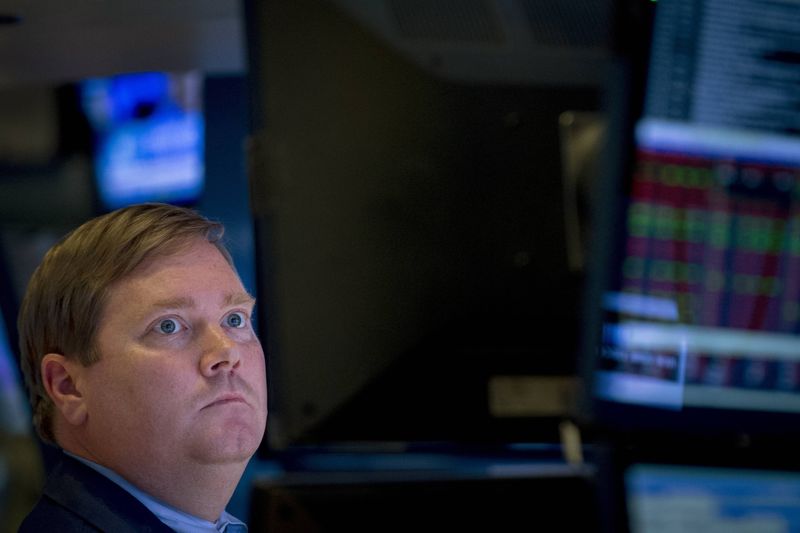(Adds U.S. market open, byline; changes dateline; previous LONDON)
* Abe resigns on health grounds; yen jumps
* Investors say lack of detail on Fed policy shift
* U.S. oil prices little moved by massive storm
* Graphic: 2020 asset performance http://tmsnrt.rs/2yaDPgn
* Graphic: World FX rates in 2020 http://tmsnrt.rs/2egbfVh
By Herbert Lash
NEW YORK, Aug 28 (Reuters) - A gauge of global equity markets rose to a new high on Friday as U.S. consumer spending in July suggested a strong economic rebound lies ahead, while the Japanese yen surged on safe-haven buying after Prime Minister Shinzo Abe resigned for health reasons.
The dollar slid and gold rose almost 2%, reversing their directions from Thursday, when the U.S. Federal Reserve laid out its new stance on inflation, which reinforced expectations of a prolonged low-interest-rate environment.
Longer-term yields climbed sharply on Thursday after Fed Chair Jerome Powell unveiled a new approach to monetary policy that puts more emphasis on fighting shortfalls in unemployment and less weight on concerns about higher inflation. consumer spending increased more than expected last month, raising expectations for a sharp rebound in growth in the third quarter, though momentum could ebb as the COVID-19 pandemic lingers and fiscal stimulus dries up. L1N2FU0Z3
The Commerce Department report also showed a rise in personal income after two straight monthly declines, while monthly inflation pushed higher.
Momentum is driving U.S. equities higher, said Tim Ghriskey, chief investment strategist at Inverness Counsel in New York.
"A lot of this is momentum. It's just fear of being left behind, fear of missing out," Ghriskey said. "Value has been outperforming growth, and you're seeing that reverse today. When growth underperforms for a period of days, it tends to rebound very sharply. We're seeing that in market preferences today."
MSCI's benchmark for global equity markets .MIWD00000PUS rose 0.4% to 585.55, after earlier setting a new intraday high, while stocks on Wall Street also rallied, with technology leading the way.
The Dow Jones Industrial Average .DJI rose 0.3%, the S&P 500 .SPX gained 0.30% and the tech-laden Nasdaq Composite .IXIC added 0.62%.
In Europe, stocks slipped as investors dumped this year's outperformers, including technology and healthcare stocks, and bid up banking shares after the Fed unveiled its new policy framework.
The broad pan-regional FTSEurofirst 300 index .FTEU3 dropped 0.39% to 1,431.48.
In Japan, the benchmark Nikkei 225 .N225 share index closed down 1.4% while the yen JPY= , seen as a safe-haven currency to buy in times of uncertainty, strengthened 1.20% versus the greenback at 105.29 per dollar.
The yen was on course for its biggest one-day jump since March, when the coronavirus pandemic roiled global markets.
There has been speculation about Abe's health all week but the resignation of Japan's longest-serving premier rattled investors, given he has spearheaded efforts to revive growth through his reflationary "Abenomics" policies. analysts said the yen's rally seemed excessive given Abe's successor was unlikely to alter economic policy significantly because Japan remains in the middle of a battle to avoid deflation and lift growth.
"You're seeing yen strength on a little bit of uncertainty," said Lou Brien, strategist at DRW Trading in Chicago. "Abenomics has been one of the more influential economic strategies."
The dollar index =USD fell 0.746%, while the euro EUR= rose 0.63% to $1.1896.
The yield on the 10-year U.S. Treasury US10YT=RR note fell 2.5 basis points to 0.7178% as investors rebalanced intermediate-dated debt following large auctions earlier this week.
U.S. Treasury auctions of roughly $150 billion worth of 3-year, 5-year and 7-year notes received strong demand starting on Tuesday. The decline in yields on each of those instruments on Friday likely reflected traders repositioning, said Subadra Rajappa, head of U.S. rates strategy for Societe Generale (PA:SOGN).
German bond yields briefly rose to their highest since early June after the Fed's decision to target average inflation.
Oil prices inched lower as storm Laura passed the heart of the U.S. oil industry in Louisiana and Texas without causing widespread damage and companies began to restart operations.
Brent crude futures LCOc1 fell $0.11 to $44.98 a barrel. U.S. crude futures CLc1 slid $0.15 to $42.89 a barrel.
Spot gold prices XAU= rose 1.98% to $1,967.11 an ounce.
<^^^^^^^^^^^^^^^^^^^^^^^^^^^^^^^^^^^^^^^^^^^^^^^^^^^^^^^^^^^ Japanese markets react to Abe resignation
https://tmsnrt.rs/3gztlNa
^^^^^^^^^^^^^^^^^^^^^^^^^^^^^^^^^^^^^^^^^^^^^^^^^^^^^^^^^^^>
